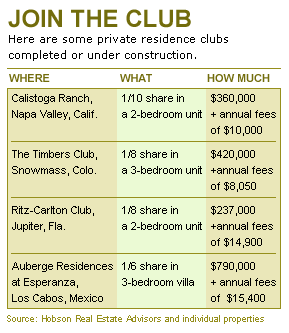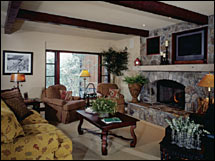BEND, Ore. (CNN/Money) – Owning a second home is great in theory. Trouble is, you may not be able to spend enough time at your vacation house to justify the mortgage or maintenance.
Enter the private residence club. These arrangements, often referred to as "fractionals," allow you to buy a share of a house or condominium in a prime vacation spot and have at your disposal a full staff of valets, concierges, housekeepers, even butlers.
Traditionally, fractional ownership plans were organized by families looking to share the cost of a second home, said Richard Ragatz, president of Ragatz Associates, a consulting firm for the resort industry.
Within the past decade, however, developers and resorts have formalized the arrangement and given it some cachet.
At the Timbers Club, in Snowmass, Colo., for example, 288 owners share 36 slope-side condos. They each have dibs on at least six weeks of vacation time each year.
Prior to each family's arrival, the staff goes grocery shopping and unpacks personal items from storage. "They can pretty much leave anything – bikes, kayaks, skis, clothing," said Gary Moore, vice president of Timbers Company, the developer.
Once there, owners have access to free transportation, round-the-clock concierge service and amenities on par with a five-star hotel. When they leave, their belongings are put back in storage and the unit is staged for the next round of owners.
The cost of such a retreat isn't cheap, but considering what you'd pay to own a similar property outright it's not as dear as you might think. A one-eighth share in three-bedroom unit at the Timbers Club recently sold for $420,000.
The maintenance fees, though steep at $8,000 a year, include property taxes, insurance and most services, said Moore. Assuming owners use all of their weeks and can resell their shares for at least what they paid the price works out to less than $200 a night.
Old concept, new name?
If you've heard the sales pitch for a timeshare, you probably understand the appeal of owning a stake in a vacation property. Of course, you're probably also familiar with the problems of timeshares – such as having to plan vacations well in advance and pay ongoing maintenance fees.

What's more, most timeshares have turned out to be pretty lousy investments.
"You're lucky to get 10 or 20 cents on the dollar when you sell a timeshare," said Wallace Hobson, president of Hobson Real Estate Advisors.
But developers say fractionals are different from timeshares for several reasons.
For one, the slice of the pie is a lot larger with fractionals. The typical timeshare owner buys just one or two weeks of time, which means one unit could potentially have 50 owners. A house or condominium at a private residence club is usually divvied up among no more than 12 owners, said Hobson, ensuring that all owners have access to the peak seasons.
The units are larger and more luxurious, with more amenities and services than at most timeshares.
To add to the air of exclusivity, many clubs don't rent vacant units to the general public, though some properties allow owners to trade for time at other private residence clubs.
 |
|
| The Timbers Club near Aspen |
Whereas marketing costs account for more than 50 percent of a timeshare's sale price, according to Ragatz, it is less than 25 percent of the sales price for a fractional. "The consumer is getting a lot more value because less of the purchase price goes out the window to marketing and sales," he said.
Finally, financing fractionals is akin to financing a second home – though more than half of all people buying into a private resident club pay cash. "The rates may be slightly higher than with a traditional mortgage," said Ragatz. "But they are nowhere near what developers charge to finance timeshares."
Is it a good investment?
"As long as the pricing is within reason, with wholly-owned second homes there no reason fractionals should not appreciate at the same rate as second homes," said Hobson.
The resale value of shares at the oldest private residence club in the country, the Deer Valley Club in Park City, Utah, has increased 16 percent a year since 2001, according to Hobson. Prices for a share in the Timbers Club, meanwhile, are 50 percent higher than what they were in 2000, and there is a waiting list of potential buyers.
Fractional ownership seems to do well in mountain resort towns and other areas where new development is limited, said Ragatz. That doesn't mean it will necessarily be successful in golf communities, beach towns and cities.
"The outlook for fractionals is better than for timeshares but it's still too early to know for sure" whether fractionals are a good investment, said Tom Kelly, co-author of "How a Second Home Can Be Your Best Investment" (McGraw Hill). "You still need to look at these things as a prepaid vacation, not an investment."

|
